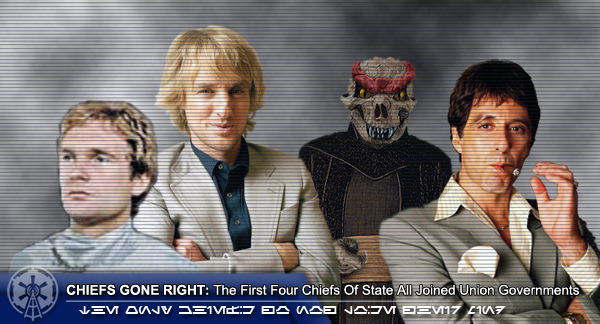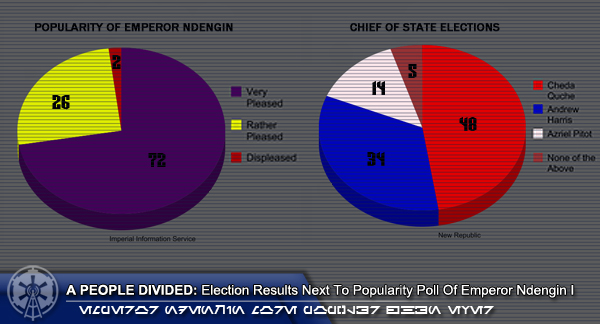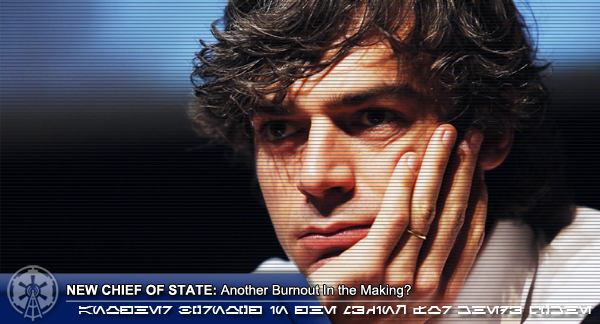Welcome to the Imperial Archives! The main source of information in the Galactic Empire. Be sure to check out the Editing Protocol before making new pages or editing articles. If you need help feel free to contact the Archives manager at archives@swc-empire.com !
A Fronte Preacipitium A Tergo Lupi (GNS)
Galactic News Service - "A Fronte Preacipitium A Tergo Lupi"
Posted by: Elvira Falston on Year 14 Day 12
From the Imperial Palace in Coruscant 9,1 on Coruscant (-15, 88).
Coruscant (INB) - Each year, the rebellious and ineffective government of the New Republic elects a new Chief of State. Although the results of these elections are met with grand fanfare and much celebratory activity, it is perhaps much ado about nothing as few of these elected representatives have ever achieved much for the Republic's desperate attempts to remain relevant and defiant towards growing Imperial influence within the galaxy. Folklore often spoken in dusty taverns and gossip halls claim the position of Chief of State is cursed, but does historical evidence indicate there may be some truth to such superstitions? Of the six people to have held the position, only the two most recent have remained citizens of a government which they once led. Many know the story of Vailis and the resurgence of the Black Sun family that broke away from the New Republic in disgust of its corrupt and inefficient political bickering that paralysed the so-called saviors of freedom, but less known examples are Sandwalker and Tlakh'sar. These two were the first and third Chiefs of State in the New Republic's early years of the government, and later revealed their ties to the Black Sun family in recent years as an indication that the continued existence of the New Republic, was a mistaken act of mercy by the powerful Black Sun organisation. The fourth Chief of State in the New Republic's history, Zeff Traner, currently holds a command position in the Tresarian Star Kingdom's military, which is another member of the Imperial Union along with Black Sun.

With so many former Chiefs of State turning their back on the New Republic after their experiences in the top leadership position, one can only assume that there is something amiss within the Republic's political system. Else, what is it about the role which sees so many former Chiefs of State eagerly moving towards the Imperial Union? Reviewing the facts and several scholarly articles written by political analysts, there is only one simple explanation: Upon becoming Chief of State, one cannot avoid being confronted with the reality of the Republic. Disillusioned after trying to implement real change in a broken government, these people either left during their term or turned their back on the Republic after feeling like little was achieved during their elected term in office.
With such a heavy burden to carry, many wonder who will be the next to test their mettle in a position to which has historically destroyed faith in the New Republic. Out of three candidates in this year's election, some analysts believe that there was only one obvious choice: High Ambassador Cheda Quche. Identified as a close associate of his predecessor, Taka Aioko, and holding the highest position of all candidates, few believed his challengers had any real chance at winning. Political analysts ponder the consequences of Quche's elections as intelligence reports suggest that he is not as popular as Taka Aiko, neither within the Republic, or within the Galactic Alliance. Quche's election to the role of Chief of State highlights the flawed electoral system of the Republic, which entails a system that is effectively a game of first-past-the-post. The issues with such an electoral system can be easily demonstrated that the government is now led by a candidate to whom the majority of voters did not wish to be their leader. Gathering only 48% of the votes in the first round of the election, Quche's supporters were not enough to win him the position. This then sparked a second round of elections amongst the top two candidates from the first round of voting. Andrew Harris, Quche's nearest rival was placed into an election with only two candidates, where he managed to lose out to Quche in a predictable ballot.

This result however has not been surprising. Analysts point out that through clever planning and barring his biggest competitors from candidacy within the elections for Secretary-General of the Galactic Alliance, Quche succeeded in obtaining that post earlier this year after the Jedi Master Onasha Katr resigned amid scandal, claiming personal issues as the reason for his departure. Despite the Republic constitution forbidding their Chief of State from holding any other positions, Quche has shown little intention of letting go of his power within the political realms of the Galactic Alliance through his position as Secretary-General. Detractors of Quche believing that this attitude will become a common trend throughout his reign, marked by the further accumulation and consolidation of power.
Whether the members of the Galactic Alliance will tolerate the new status of Quche remains to be seen, but it is no secret that High Ambassador Quche was not the most popular Ambassador of the Republic in the eyes of other governments. Professors from the University of Coruscant expect "interesting developments in the political relations between Alliance members as the Republic attempts to exert control over the others through technology as some members struggle to maintain their sovereignty". This is shown by the pressure the New Republic has placed on its allies after a recent galactic census conducted by several notable Imperial universities revealed that a number of Alliance governments are struggling to stop emigration from their territories, and are showing a decline in population. Intelligence reports outline scenarios where these governments are slowly being pushed to surrender their sovereignty and be absorbed into larger members of the Alliance where the Republic can exert greater control. The recent case of Wim Jurgen surrendering Commonality to the Krath Lords without informing a single other Commonality official was cited as an example of this mounting pressure on smaller governments.

What the reign of Cheda Quche will bring is still subject to much debate, and only time will reveal whether the diplomat's tenure will be marked by the same level of low achievement as Taka Aioko, or even whether the galaxy will see a consolidation of power in the Chief of State's office as he tries to wrestle the political mayhem of the Republic into submission and efficiency; a scenario that some have tipped to potentially echo that of Emperor Drayson's establishment of the New Order. Ultimately, the odds are not in his favor as most Chiefs of State have discovered in their time at the pinnacle of the New Republic's politics.